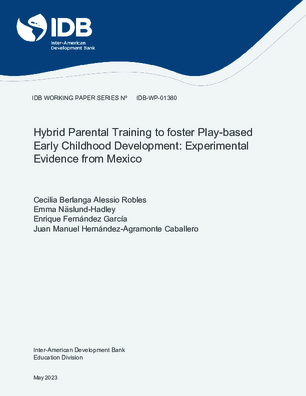Hybrid parental training to foster play-based early childhood development: experimental evidence from Mexico
Date
May 2023
Play during early childhood is key to stimulating childrens physical, social, emotional and cognitive development; it promotes their imagination and creativity, improves their problem-solving skills and enhances their learning readiness by providing the foundations to build skills later in their lives. Parental engagement in play-based learning at home is one of the behaviors most consistently associated with positive child development. However, it is concerning that levels of parental engagement in play activities have been found to be lower in low-resourced settings. Additionally, research on play-based learning is largely limited to high-income countries and little is known about the use of hybrid interventions that promote play-based learning at home. This study uses an experimental design to estimate the effects of a hybrid large-scale parental program to promote play-based learning in the state of Morelos, Mexico. We found a positive impact on parental investment, as caregivers of the treatment group had a FCI 0.13 SD higher than the control group. The treatment group performed the following activities more often than the control group: reading books /looking at pictures (0.12 SD), singing songs (0.11 SD), and playing with toys (0.17 SD), which incentivize learning, emotional and cognitive skills development in children. The study also found a significant effect of 0.19 SD on the CDC index for those caregivers who invested less than the median FCI at the baseline. Our findings support the importance of parental training for increased quality and time of caregiver investments in play activities, which lead to improved child outcomes, especially among children in households with the lowest levels of caregiver investment at baseline.




